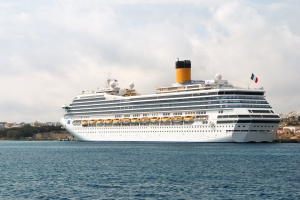As the United Kingdom struggles and overreacts to cope with a few inches of snow, the relative resilience of land, sea and air transport has been put to the test.
On Sunday morning four Eurostar trains were cancelled and there were delays of about half-an hour on all the remaining services as the unfamiliar white stuff forced the 21st-century trains to go more slowly.
At least 300 flights from London’s Heathrow airport, more than a fifth, were cancelled as more snow fell in London. The disruption was set to continue into Monday as Heathrow’s management said it would reduce its capacity by ten percent – about 130 fewer flights.
And the ferries? Channel and North Sea ferry crossings were ‘unaffected’. In the far north, there were warnings of possible disruption to some Scottish ferry sailings off the west and north coasts of mainland Scotland, ‘due to adverse weather conditions’, but as of 10.00 hrs on Monday 21 January, no disruption has been reported.
Well, we’ve been trying to operate planes in snow and ice for about a hundred years, trains for 170 and ships for …perhaps 2,000 out of the 5,000 they have been in existence. When it snows, it clearly shows!
Chris Bellamy.
